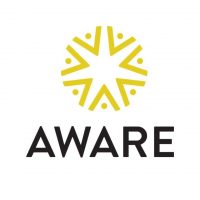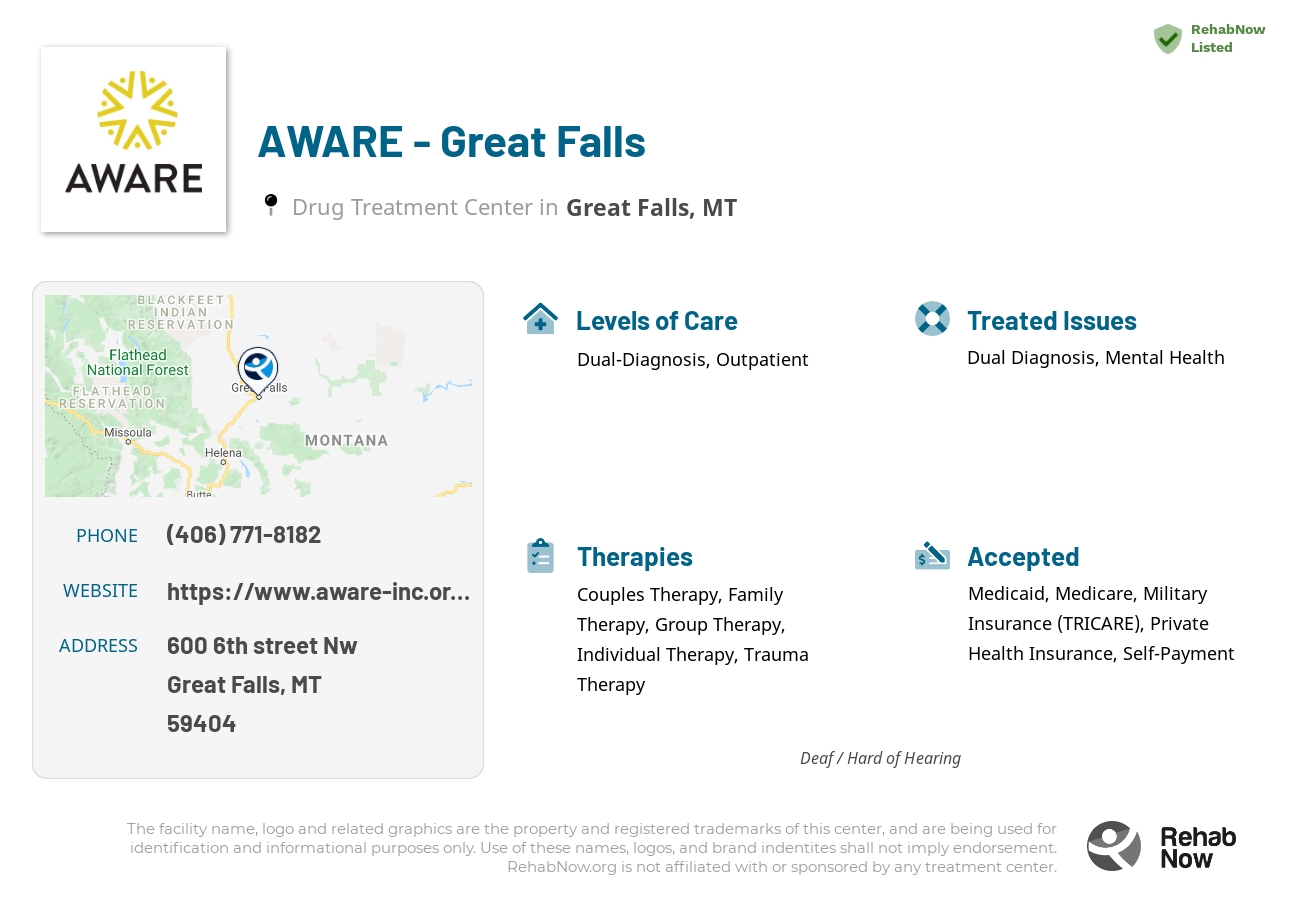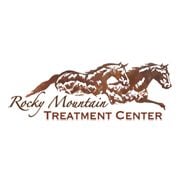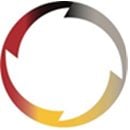AWARE - Great Falls
Drug Rehab Center in Great Falls, Montana
AWARE - Great Falls in Montana is a licensed and accredited facility that offers a full range of services for substance abuse and addiction, including inpatient care, aftercare support, detoxification, outpatient care, dual-diagnosis therapy, relapse prevention, trauma processing, family therapy, and lifestyle education, with private health insurance accepted.
About AWARE - Great Falls in Montana
AWARE - Great Falls, nestled in Great Falls, Montana, stands as a beacon for individuals struggling with dual diagnosis and mental health issues. Unique in its approach, this private rehab facility focuses on treating co-occurring disorders, offering a holistic path to recovery.
Accredited by CARF, AWARE - Great Falls upholds a high standard of care, blending evidence-based practices with comprehensive treatment services. This ensures every individual receives personalized support tailored to their dual-diagnosis needs.
- Specializes in treating dual diagnosis, recognizing the crucial link between mental health and substance abuse.
- Offers a variety of treatment services, including outpatient programs and inpatient care, to suit diverse recovery needs.
- Provides aftercare support to empower long-term sobriety and prevent relapse.
At AWARE - Great Falls, treatment encompasses a range of issues from drug addiction and alcoholism to complex mental health challenges. Utilizing detoxification services, outpatient and inpatient care, patients embark on a holistic recovery journey.
Genders
Ages
Modality
Additional
Accreditations

CARF
The Commission on Accreditation of Rehabilitation Facilities (CARF) is a non-profit organization that specifically accredits rehab organizations. Founded in 1966, CARF's, mission is to help service providers like rehab facilities maintain high standards of care.
Conditions and Issues Treated
A “dual diagnosis” is when the individual has two medical issues at the same time. The top co-occurring mental disorders with addiction are depression, anxiety, ADHD, bi-polar disorder. Addiction is also considered a mental illness that is not a choice but rather a medical condition. Addiction can be caused by any number of underlying issues.
Dual diagnosis is provided by AWARE - Great Falls to treat addictive tendencies as well as any untreated mental illnesses. This ensures successful long term health and recovery for patients after treatment has been completed.
Dual diagnosis is provided by AWARE - Great Falls to treat addictive tendencies as well as any untreated mental illnesses for people in Montana. This ensures successful long term health and recovery for patients after treatment has been completed.Levels of Care Offered
This center offers a variety of custom treatment tailored to individual recovery. Currently available are Dual-Diagnosis, Outpatient, with additional therapies available as listed below.
Outpatient programs at AWARE - Great Falls, the Great Falls resident can live with their family while continuing with their job or studies. Treatment includes educating the patient on drug abuse, medications, and counseling sessions at the individual or group level. Outpatient treatment plans cover diagnosis, detoxification, management, and counseling. They are a popular option for those who have graduated from inpatient facilities.
Therapies & Programs
Individual therapy is a form of counseling where you meet with a trained professional one-on-one. Meeting with a therapist in this setting allows for a personal and trusting relationship to be built. This allows the patient to open up about sensitive or private issues they may not feel comfortable discussing in a group. Individual therapy helps identify the root causes of your addiction, which can help prevent relapse.
Couples therapy for drug addiction is a unique form of therapy that allows family members to work through the emotional issues of their loved one’s addiction together. Family members can support each other while learning how to cope with the addiction and encourage healthy changes. The two will work with a therapist to learn how the addiction affects themselves and the relationship.
Family therapy is often done alongside drug treatment to help addicts stay sober. The goal of family therapy for drug addiction is to create an environment where communication can happen without judgment, hostility, or blame. The therapist will sit with the family so they can learn how to communicate differently and provide new tools for dealing with emotions so that people don’t want to drink or do drugs. It’s important for families to focus on relapse prevention plans during treatment so that if the addict feels like they want to use again, they’ll know what steps they need to take together to prevent it from happening again in the future.
Group therapy sessions are another common addiction recovery service. These group sessions typically involve six to 12 addicts who meet regularly with a trained professional for support and guidance.
During these sessions, the group shares their experiences with one another and provides feedback that can help each member avoid relapse or overcome specific obstacles they are facing in their recovery process. With this type of support and guidance, addicts can feel like they are part of a community that understands their struggles and will help them get through the hard times.
Many people struggling with drug addiction have experienced some form of trauma in their lives. It is crucial that these individuals seek out professional help; otherwise, their drug abuse and addiction will likely continue.
Therapists and counselors at drug treatment centers employ several treatment programs to help people struggling with drug addiction, including trauma therapy. Trauma therapy helps people dealing with addiction by allowing them to confront the traumas of their past and move past them.
It is important to note that trauma therapy should not be confused with PTSD (post-traumatic stress disorder). Rather, it is used to treat the effects of trauma, which are often at the root of addiction.
Cognitive Behavioral Therapy (CBT) focuses on the underlying thoughts and behaviors that caused the problem of addiction in the first place and may cause a relapse. Negative feelings are common in drug abuse disorders, but they can lead to co-occurring disorders if not recognized. CBT involves strategies that help to change the behavior pattern by restructuring negative thoughts into positive ones. It helps to remove these feelings, and it provides long-term benefits. Also, CBT promotes self-awareness and self-control. It can be administered as a monotherapy or as part of combination therapy.
CBT can improve the patient’s mood, reduce drug cravings and boost success rates on treatment plans. Regular practice can help individuals handle negative attitudes, thoughts, and feelings without turning to drugs or alcohol. The core belief of Cognitive Behavioral Therapy (CBT) is that one’s moods, behaviors, and actions are all connected. Individuals can improve their quality of life using CBT. It helps addicts understand the patterns of thought and feelings that cause them to use drugs or alcohol and develop a healthy response.
Payment Options Accepted
For specific insurance or payment methods please contact us.
Is your insurance accepted?
Ask an expert, call (888) 674-0062
AWARE Associated Centers
Discover treatment facilities under the same provider.
- AWARE - Missoula in Missoula, MT
- AWARE - Butte in Butte, MT
- AWARE - Helena in Helena, MT
- AWARE - Billings in Billings, MT
- AWARE - Bozeman in Bozeman, MT
Learn More About AWARE Centers
Additional Details
Specifics, location, and helpful extra information.
Great Falls, Montana 59404 Phone Number(406) 771-8182 Meta DetailsUpdated April 15, 2024
Staff Verified
AWARE - Great Falls Patient Reviews
There are no reviews yet. Be the first one to write one.
Great Falls, Montana Addiction Information
Montana has one of the highest rates of drug and alcohol abuse in the nation. More than 280,000 of its residents engage in drug or alcohol abuse every year. Marijuana, in particular, is heavily used among high school students. Despite these daunting trends, the state is grappling with the issue head-on.
Prescription drug overdose deaths in Great Falls, Montana have quadrupled in the last decade. 7% of the population aged 12 and over is addicted to some type of illicit drug. Methamphetamines are the most common drug of choice, followed by marijuana and prescription drugs. There are about 1,000 teens in Great Falls who use crystal meth every month. The most common treatments include inpatient and outpatient rehab, 12-step programs, and residential treatment.
Treatment in Nearby Cities
- Anaconda, MT (122.9 mi.)
- Conrad, MT (53.7 mi.)
- Harlem, MT ( mi.)
- Clancy, MT (79.0 mi.)
- Billings, MT (179.7 mi.)
Centers near AWARE - Great Falls
The facility name, logo and brand are the property and registered trademarks of AWARE - Great Falls, and are being used for identification and informational purposes only. Use of these names, logos and brands shall not imply endorsement. RehabNow.org is not affiliated with or sponsored by AWARE - Great Falls.





